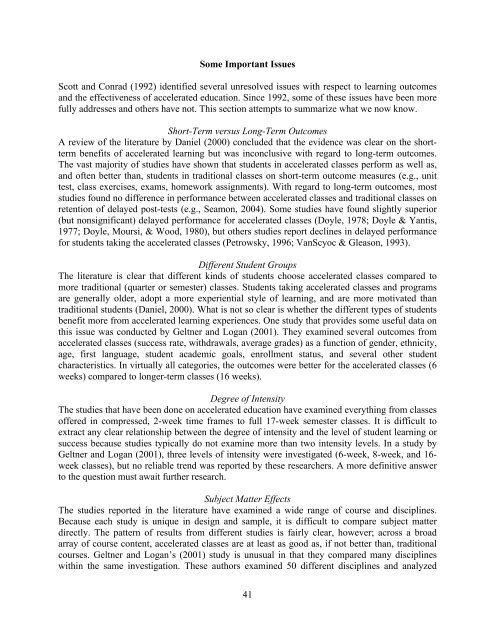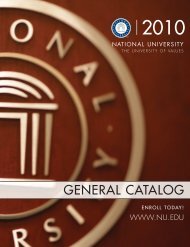Journal of Research in Innovative Teaching - National University
Journal of Research in Innovative Teaching - National University
Journal of Research in Innovative Teaching - National University
You also want an ePaper? Increase the reach of your titles
YUMPU automatically turns print PDFs into web optimized ePapers that Google loves.
Some Important Issues<br />
Scott and Conrad (1992) identified several unresolved issues with respect to learn<strong>in</strong>g outcomes<br />
and the effectiveness <strong>of</strong> accelerated education. S<strong>in</strong>ce 1992, some <strong>of</strong> these issues have been more<br />
fully addresses and others have not. This section attempts to summarize what we now know.<br />
Short-Term versus Long-Term Outcomes<br />
A review <strong>of</strong> the literature by Daniel (2000) concluded that the evidence was clear on the shortterm<br />
benefits <strong>of</strong> accelerated learn<strong>in</strong>g but was <strong>in</strong>conclusive with regard to long-term outcomes.<br />
The vast majority <strong>of</strong> studies have shown that students <strong>in</strong> accelerated classes perform as well as,<br />
and <strong>of</strong>ten better than, students <strong>in</strong> traditional classes on short-term outcome measures (e.g., unit<br />
test, class exercises, exams, homework assignments). With regard to long-term outcomes, most<br />
studies found no difference <strong>in</strong> performance between accelerated classes and traditional classes on<br />
retention <strong>of</strong> delayed post-tests (e.g., Seamon, 2004). Some studies have found slightly superior<br />
(but nonsignificant) delayed performance for accelerated classes (Doyle, 1978; Doyle & Yantis,<br />
1977; Doyle, Moursi, & Wood, 1980), but others studies report decl<strong>in</strong>es <strong>in</strong> delayed performance<br />
for students tak<strong>in</strong>g the accelerated classes (Petrowsky, 1996; VanScyoc & Gleason, 1993).<br />
Different Student Groups<br />
The literature is clear that different k<strong>in</strong>ds <strong>of</strong> students choose accelerated classes compared to<br />
more traditional (quarter or semester) classes. Students tak<strong>in</strong>g accelerated classes and programs<br />
are generally older, adopt a more experiential style <strong>of</strong> learn<strong>in</strong>g, and are more motivated than<br />
traditional students (Daniel, 2000). What is not so clear is whether the different types <strong>of</strong> students<br />
benefit more from accelerated learn<strong>in</strong>g experiences. One study that provides some useful data on<br />
this issue was conducted by Geltner and Logan (2001). They exam<strong>in</strong>ed several outcomes from<br />
accelerated classes (success rate, withdrawals, average grades) as a function <strong>of</strong> gender, ethnicity,<br />
age, first language, student academic goals, enrollment status, and several other student<br />
characteristics. In virtually all categories, the outcomes were better for the accelerated classes (6<br />
weeks) compared to longer-term classes (16 weeks).<br />
Degree <strong>of</strong> Intensity<br />
The studies that have been done on accelerated education have exam<strong>in</strong>ed everyth<strong>in</strong>g from classes<br />
<strong>of</strong>fered <strong>in</strong> compressed, 2-week time frames to full 17-week semester classes. It is difficult to<br />
extract any clear relationship between the degree <strong>of</strong> <strong>in</strong>tensity and the level <strong>of</strong> student learn<strong>in</strong>g or<br />
success because studies typically do not exam<strong>in</strong>e more than two <strong>in</strong>tensity levels. In a study by<br />
Geltner and Logan (2001), three levels <strong>of</strong> <strong>in</strong>tensity were <strong>in</strong>vestigated (6-week, 8-week, and 16-<br />
week classes), but no reliable trend was reported by these researchers. A more def<strong>in</strong>itive answer<br />
to the question must await further research.<br />
Subject Matter Effects<br />
The studies reported <strong>in</strong> the literature have exam<strong>in</strong>ed a wide range <strong>of</strong> course and discipl<strong>in</strong>es.<br />
Because each study is unique <strong>in</strong> design and sample, it is difficult to compare subject matter<br />
directly. The pattern <strong>of</strong> results from different studies is fairly clear, however; across a broad<br />
array <strong>of</strong> course content, accelerated classes are at least as good as, if not better than, traditional<br />
courses. Geltner and Logan’s (2001) study is unusual <strong>in</strong> that they compared many discipl<strong>in</strong>es<br />
with<strong>in</strong> the same <strong>in</strong>vestigation. These authors exam<strong>in</strong>ed 50 different discipl<strong>in</strong>es and analyzed<br />
41

















